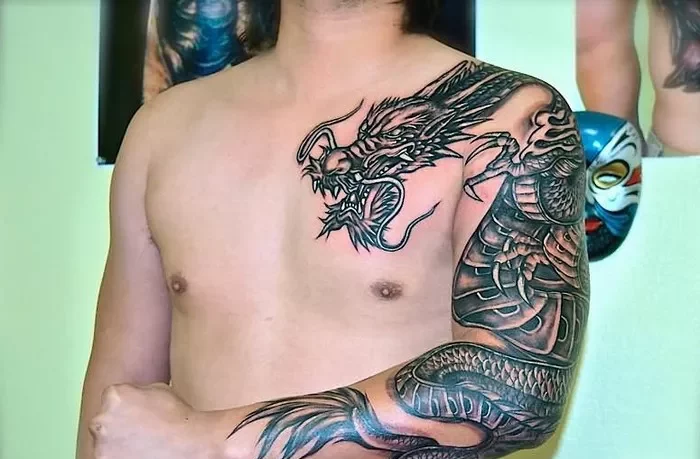Tattoos have transcended mere body art; they are often deeply symbolic, representing aspects of identity, culture, and personal beliefs. Among the myriad of tattoo designs, the Chinese dragon holds a special allure for many due to its rich symbolism and historical significance. However, before adorning oneself with such a potent symbol, it’s crucial to understand the cultural context and approach the decision with respect and mindfulness. In this article, we delve into the meanings behind the Chinese dragon tattoo, explore its cultural significance, discuss considerations for those contemplating getting one, and emphasize the importance of cultural sensitivity in tattoo choices.
The Symbolism of the Chinese Dragon
In Chinese culture, the dragon is revered as a symbol of power, strength, and good fortune. Unlike the fire-breathing, malevolent creatures of Western mythology, the Chinese dragon is benevolent and associated with auspicious qualities. It is believed to bring blessings, prosperity, and protection to those who honor it.
The dragon is deeply intertwined with Chinese mythology and folklore, often depicted as a divine creature capable of controlling the elements and transcending earthly realms. It is also associated with the Emperor, representing imperial authority and divine right. As such, the dragon has been a ubiquitous symbol in Chinese art, architecture, and literature for millennia.
Understanding Cultural Appropriation
Before considering a Chinese dragon tattoo, it’s essential to address the concept of cultural appropriation. Cultural appropriation occurs when elements of a marginalized culture are adopted by members of a dominant culture without understanding or respect for their significance. This can lead to the trivialization or distortion of cultural symbols and practices, causing harm and offense to those whose culture is being appropriated.
In the context of tattoos, cultural appropriation often occurs when individuals choose designs from cultures they have no connection to, treating them as mere fashion statements without regard for their cultural or spiritual significance. This can be particularly problematic when sacred or deeply meaningful symbols are involved, such as the Chinese dragon.
Respectful Approaches to Getting a Chinese Dragon Tattoo
While cultural appropriation should be avoided, it is possible for individuals outside of Chinese culture to get a Chinese dragon tattoo respectfully. Here are some considerations for those contemplating such a tattoo:
1. Educate Yourself: Take the time to research the cultural significance of the Chinese dragon and understand its meanings within Chinese mythology and symbolism. Learning about its history and significance will deepen your appreciation for the symbol and help you approach it with respect.
2. Consult with a Tattoo Artist: Find a tattoo artist who is knowledgeable about Chinese symbolism and culture. They can help you design a tattoo that honors the tradition of the Chinese dragon while also incorporating your own personal style and meaning.
3. Personal Connection: Reflect on why you are drawn to the Chinese dragon as a tattoo design. Do you resonate with its symbolism of strength, power, or protection? Are you interested in Chinese culture and history? Having a personal connection to the symbol can help ensure that your tattoo is meaningful and authentic to you.
4. Consider Placement and Size: Think carefully about where you want to place your tattoo and how large you want it to be. Certain placements may have cultural significance or associations, so it’s important to be mindful of this when choosing the location.
5. Respectful Imagery: When designing your tattoo, avoid caricatured or stereotypical depictions of the Chinese dragon. Opt for a design that is true to traditional Chinese art and symbolism, and avoid any elements that could be considered disrespectful or offensive.
6. Acknowledge Cultural Differences: Be aware that your tattoo may be interpreted differently by individuals from Chinese culture. While you may view it as a symbol of admiration or appreciation, others may perceive it as cultural appropriation. Be prepared to engage in respectful dialogue if your tattoo is questioned or misunderstood.
7. Support Chinese Artists: Whenever possible, consider working with a tattoo artist of Chinese descent or someone who specializes in Chinese-inspired tattoos. Supporting artists from the culture you are drawing inspiration from can help foster cultural exchange and appreciation.
Conclusion
Getting a Chinese dragon tattoo can be a meaningful and empowering experience, but it’s essential to approach it with cultural sensitivity and respect. By taking the time to educate yourself, consult with knowledgeable artists, and reflect on your personal connection to the symbol, you can ensure that your tattoo is a genuine expression of admiration and appreciation for Chinese culture. Remember that cultural symbols carry deep significance for the communities that cherish them, and it’s important to honor that significance in your tattoo choices.

